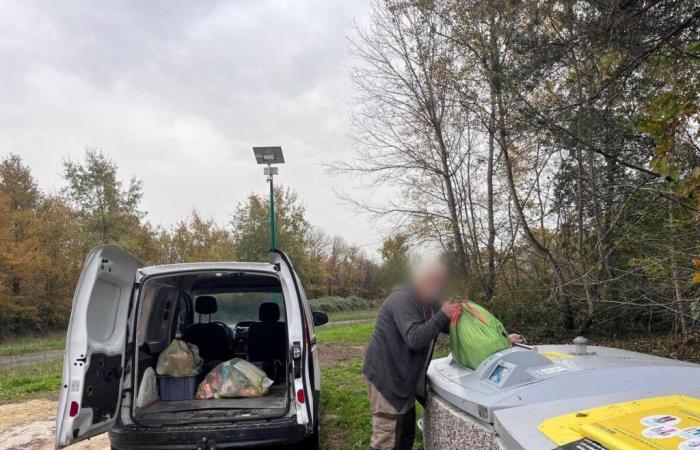LWill 2025 be the year when garbage collectors return to your door? This is the wish of some of the inhabitants of Dordogne. Those who are involved in associations fighting against the collection of waste at voluntary drop-off points (PAV), are in any case banking on an appeal to the administrative court. The Bordeaux court will have to say whether the system complies with the law or not. With an advantage for the protesters: in 2023, the administrative court of Toulouse ruled in favor of the inhabitants of Haute-Garonne who contested the installation of the PAVs. They went back to door-to-door collection.
While waiting for the issue to be decided by the courts, it is clear that this method of collection is causing dissatisfaction in Périgord: people with reduced mobility, those who pay more than before… So, can we do otherwise?
Incivility (like here, in Vergt) is a collateral damage of the PAV waste collection method.
Bernard Vasseur
Local fronds
In any case, there are some who absolutely do not want to reproduce the example of the Dordogne. In Gironde, residents of Libourne are up in arms against the project of the local waste union which plans to launch PAVs, with badges for black AND yellow bins. “We closely followed what was done in Dordogne,” assures Arnaud Bobet. The president of the Union for the Defense of Citizens of Haute-Gironde (UDCHG) met with the Périgord associations: “The Dordogne was a triggering factor in our mobilization. »
Clearly, they take the 24th as a counter-example of what should be done. And to fight against the Smicval project (the equivalent of SMD3 here), these opponents welcome a triple mobilization: popular (with associations), judicial (with an appeal before the administrative court) and political. On this last point, Michel Vilatte is well placed to speak: “I am plagued in my own majority,” explains the municipal councilor of Saint-André-de-Cubzac (led by socialists). “It is fundamental to mobilize against this project. Elected officials must move. It's very hard, because there is pressure. But I encourage elected officials to say no. »
“We are not against the polluter pays principle, but we must be educational”
In Haute-Gironde, we do not want a system equivalent to the Dordogne. But what to replace it with? “We are not against the polluter pays principle,” assures Mr. Bobet. But you have to be an educator. »
As such, they cite Calitom as an example. The Charentais union replaced the black bags with transparent bags. “This allows users to know if sorting has been done,” explains François Filippi, the director. “When they take out their household waste bag, they see what they threw away during the week and whether they sorted it correctly or not. This transparency acts as an effect that everyone remembers. »
And there, no voluntary contribution point! Bins are collected door-to-door: every two weeks for household waste, every week for the yellow bin. “It costs a little more than with PAVs,” admits Calitom, “but it produces interesting results in terms of treatment. So the balance is favorable. The results of voluntary drop-off points are negative: they produce more waste, because when the bin belongs to everyone, it belongs to no one. »
“Drifts”
And above all, opponents of the incentive fee see another advantage: “Incentive pricing was not chosen in Charente because it can produce excesses or encourage acts of incivility, judges Mr. Filippi. We encourage people without financial pressure and we achieve the same results. People sort more, or even better. »
The director of Calitom also praises the social virtues of its pricing: “The Teom is a tax considered unfair by some, but it reflects a social reality. It is a percentage of the property tax, depending on the dwelling. Therefore, the cost of household waste removal is distributed among those who have the means. There is still an unfair side. For example, when you are alone in a large house, you pay a lot, but when there are six people in a public housing project, you pay little. As for the fee, it produces the opposite effect. »
“All this reflects a great improvisation”
If we want to summarize, no system achieves perfection. It is above all a political choice. But in Dordogne, have we even asked the inhabitants? This is what the Dordogne Citizens' Association for the Fight against Waste for a Public Service (ACLD24PSP) criticizes. “The users' commission was only set up once the system was installed,” regrets Christian Naudet, one of the members, who sees it as a “problem of method. All this reflects a great deal of improvisation. »
Josette Dagneau-Charenton, another member, criticizes the way in which the SMD3 presented the reform: “The 2015 law says that we must reduce waste, but it says nothing else. The PAVs and the incentive fee are a unilateral decision which masked all the alternatives. There is a mistake from the start. »
Towards a moratorium?
The association points out, for example, the punitive nature of the bill, which is compulsory, for households committed to zero waste, who pay without ever using the buried terminals.
The ACLD24PSP therefore hopes to obtain, in court, the cancellation of the system deployed by the SMD3. “If the administrative court wins our case, we want an immediate moratorium,” explains Ms. Dagneau-Charenton. And to find a new system, we must involve the population and all stakeholders. »
The court will act as justice of the peace in this much-debated conflict.
Counterpoint
The SMD3 does not lack arguments. In 2020, its president Pascal Protano stated this: “Wherever the PAVs have been installed, they have reduced the tonnage of black bags and increased that of sorted waste. With curbside pickup, people tend to put everything in their trash without thinking. » The figures seem to prove him right: between 2020 and 2023, household waste fell by 40% and recyclable waste increased by the same amount. But for opponents, this is explained by illegal dumping of garbage.






